- Home
- Martin Amis
Lionel Asbo: State of England Page 3
Lionel Asbo: State of England Read online
Page 3
So, this day, he went down the tunnel and attended school. But on his way home he feinted sideways and took a detour. With hesitation, and with deafening self-consciousness, he entered the Public Library on Blimber Road. Squeers Free had a library, of course, a distant Portakabin with a few primers and ripped paperbacks scattered across its floor … But this: rank upon rank of proud-chested bookcases, like lavishly decorated generals. By what right or title could you claim any share of it? He entered the Reading Room, where the newspapers, firmly clamped to long wooden struts, were apparently available for scrutiny. No one stopped him as he approached.
He had of course seen the dailies before, in the corner shop and so on, and there were Gran’s Telegraphs, but his experience of actual newsprint was confined to the Morning Larks that Lionel left around the flat, all scrumpled up, like origami tumbleweeds (there was also the occasional Diston Gazette). Respectfully averting his eyes from the Times, the Independent, and the Guardian, Des reached for the Sun, which at least looked like a Lark, with its crimson logo and the footballer’s fiancée on the cover staggering out of a nightclub with blood running down her neck. And, sure enough, on page three (News in Briefs) there was a hefty redhead wearing knickers and a sombrero.
But then all resemblances ceased. You got scandal and gossip, and more girls, but also international news, parliamentary reports, comment, analysis … Until now he had accepted the Morning Lark as an accurate reflection of reality. Indeed, he sometimes thought it was a local paper (a light-hearted adjunct to the Gazette), such was its fidelity to the customs and mores of his borough. Now, though, as he stood there with the Sun quivering in his hands, the Lark stood revealed for what it was—a daily lads’ mag, perfunctorily posing as a journal of record.
The Sun, additionally to recommend it, had an agony column presided over not by the feckless Jennaveieve, but by a wise-looking old dear called Daphne, who dealt sympathetically, that day, with a number of quite serious problems and dilemmas, and suggested leaflets and helplines, and seemed genuinely …
“Dear Daphne,” whispered Desmond.
5
Turn the clock back to January and the eve of his fifteenth birthday.
Uncle Lionel was out on the balcony, chivvying the dogs. Des, in a white apron (at that time he had done no wrong and knew no guile), was washing up.
Come out here, Des. Forget you housework … Listen. You forbidden to go to school tomorrow.
Why’s this, Uncle Li?
Tell you in the morning … Des. Girls. Have you done it? No, don’t answer. I don’t want to know. Look at you in you white pinny. Fourteen.
Des was woken by a gust of cigarette smoke. He squinted up with his unfallen eyes. Lionel, in a black mesh T-shirt, boded over him.
Shove up, he said, and sat. Okay. You a young man now. You fifteen. And an orphan. So you got to listen to you Uncle Li.
Yeah. Course.
Right. From this day forth, son, you can borrow me Mac. When I’m out.
Smiling, Des said thanks, and he meant it. He also had that familiar sense of Lionel as a kind of anti-dad or counterfather.
But listen. Lionel raised a stubby forefinger. It’s not just for messing around with. I want you to concentrate you efforts.
On what?
Porn.
In common with every other Distonite old enough to walk, Des knew about the existence of pornography on the Web. He had never gone looking for it. Porn, Uncle Li?
Porn. You see, Des, this is it. You don’t actually need girls. Girls? They more trouble than they worth if you ask me. With the Mac, you can have three new bunk-ups every day—just by using you imagination! And it doesn’t cost you fuck all. Okay. Lecture over. So endeth the first lesson. Just promise you’ll ponder me words. And here’s an extra fiver for yuh.
Lionel got to his feet. He grinned (a rare occurrence) and said,
Go on, fill you boots … When I come back tonight, you’ll be holding a white stick. In you hairy palm. His grin deepened. I just hope Jeff and Joe hit it off with you guide dog. And here’s a tip: Fucked-up Facials. Start you off on the right foot. Well, son. Happy birthday. I’m glad we had this talk. It’s cleared the air.
Des did, in fact, have a quick look at Fucked-up Facials. And the site, he found, was accurately so called: he had never seen anything half so fucked-up in all his life. After gaping his way through thirty seconds of that, he clicked on History. There was no doubt about it. The pornography Lionel watched was in highly questionable taste. So for an hour Des randomly surfed, or foundered, in the Pacific of filth. This surfing or foundering, he realised with a kind of terror, was a way of finding out who you were, sexually, by finding out what you liked—whether you liked what you liked or not.
And what did he like, Des Pepperdine? Well, his soul instantly and reassuringly recoiled from anything weird. Or anything rough. In churning and interminable close-up, even straightfoward copulation looked horrific (this is what happens, he suddenly thought, when a zoo rapes an aquarium). And all these stripped blokes, with biker or convict faces, and their third-degree tattoos … The lez stuff was okay, but what he liked, it turned out, was this: a pretty girl acting alone, slowly undressing (it was never slowly enough), and indulging, perhaps, in a discreet self-caress—with the lighting all misty and vague. Practically everything else seemed gladiatorial. I’m a romantic! he thought. I knew it … And after a pensive interlude, under the auspices of Strictly Solo Tease and more particularly a wandlike blonde called Cadence Meadowbrook, Des put the Web aside, reached for the Cloud, and started learning about calligraphy.
The Cloud, the Web: it was the fruit of the Tree of Knowledge—the Knowledge of Good and Evil. It was the modern Fall. And there was no going back.
You’re doing that funny face again, he said during his next session with Alektra.
What funny face?
Like you’re looking in a mirror. Or at a camera … Ow. That hurts.
Chanel was the same—and Joslinne, and Jade. What did you expect? They had started learning about the birds and the bees (in high definition) when they were three.
… Why’re you always spitting and saying how nasty you are?
Boys expect it.
He said, Not me. You see, love, I’m a romantic. It’s just the way I’m made.
And it was all so very different with Grace.
That first time, when she was giving him the funny looks, he was paralysed by the unreality of it all, what with the Dubonnets—and then the babydoll! Come over here, handsome, and give us a cuddle. This was the unalterable premise: he couldn’t hurt her, he couldn’t spurn her, it wasn’t in him, it wasn’t the way he was made. So he walked across the room. And what a long walk that was—fifteen feet, across the granny flat, from grace to Grace. He walked across the room because of the clear impossibility of doing otherwise, and entered the heedless world of the deaf. Then he lay back and succumbed to an experiment—an experiment in gentleness. And the texture of her flesh to the touch, with that strange give in it, and the depth of all that lived life, now brought languidly to bear on him and his body.
Oh, you’re so beautiful, Desi my dearest. It hurts my heart you’re so beautiful.
And his heart, in its turn, flared up on him, like an inner climax running through his chest to his throat. He kissed her neck. She touched his brow. On the table was a jar of strawberry jam with a spoon in it. The stereo, with its tiny but furious red eye, was playing “If I Fell.”
That was in March, and now it was April. It was April, with its drip drip drip …
“Des, there’s something I never told you.”
They were getting dressed. It was all behind them for the moment—the soundproofed laboratory of sin.
“What’s that, Gran? Sorry. What’s that, Grace?”
“Remember—remember when I used to have gentlemen friends? Remember Toby?”
“Toby. I remember. And Kevin.”
“And Kevin. Guess why I stopped.”
&nbs
p; “Why?”
“Because of Lionel … Remember the summer your grandad died?”
Dominic Oldman was out fishing with his boy Mark (the one child of his twelve-year marriage to a pharmacist named Eileen). And suddenly nature became too big and too loud, and Mark slipped down the bank and into the headstrong River Avon, and Dominic went in after him. Only Mark came back—only Mark came back from under the thick nets of the mists.
“They let Lionel out of Yoi for the cremation. You were there, Des. After it was over, he sees me home, he comes in here, and he takes the Bible down from the shelf. And he jams my hand on it and makes me swear. No more of your bleeding geezers, Mum, he says. No more of your nonsense, woman. You’re past it anyway. It’s all over.”
Des pictured himself—that day in Golders Green, wearing white shirt, blue tie, black longs. He was ten. Gran would have been thirty-four.
“And he scared me. He really did.” She held her wrist and rotated it. “Time goes by and Toby pops in for a cup of tea. He’s been here half an hour and the doorbell rings. Lionel. He drags poor Toby out by his hair and gives him a right mauling there on the steps. For a cup of tea! Ooh. Mean Mr. Mustard. See, he’s got spies … Don’t look so stricken, Des! It’s all right with you—you’re in and out all the time anyway. And I’m your gran.”
She gave her strange new spiralling laugh, reached for the crossword, and sat down with a bounce on the windowside armchair.
“Eight letters … It’s an anagram. Got it. Features.”
“Yeah? What’s the clue?”
“Mug smashed after use.”
As he walked through the spangles of an April shower (he was going to the sub-post office for an envelope and a first-class stamp), Des was thinking of things his mother told him—about Lionel as a child.
The nickname Mean Mr. Mustard was derived from the Beatles song, and referred not just to Lionel’s spite but also to his stinginess (Sleeps in a hole in the road … Keeps a ten-bob note up his nose. Such a mean old man). He earned the nickname during his toddler period—he was an implacable hoarder and non-sharer. If any of the brothers played with his toys (even when he wasn’t there), they lived to wish they hadn’t. John, Paul, George, Ringo and Stuart were all very afraid of their little brother. John, who was then aged seven, told Cilla, who was then aged eight, that he was very afraid of Lionel, who was then aged two.
Last thing at night little Lionel would seal the lid of his toybox with a moistened strand of hair plucked from his own scalp. So he could tell if anyone took a liberty while he was asleep … Then he made his enquiries (it was nearly always Ringo); and the next time Ringo was asleep, Lionel would steal up on him wielding his heaviest Transformer.
He was served his first Restraining Directive when he was three. Three years and two days: a national record (though disputed by other claimants). This was for smashing car windscreens with paving stones; the authorities also noted his habit, when out shopping with his mother, of booting over display pyramids of bottles and tin cans; a childish interest in cruelty to animals was perhaps only to be expected, but Lionel went further, and one night made a serious attempt to torch a pet shop. Had he come along half a generation later, Lionel’s first Restraining Directive would have been called a BASBO, or Baby ASBO … ASBO, which (as all the kingdom now knew) stood for Anti-Social Behaviour Order.
What was the matter with him? Why did he work at being stupid? I mean (thought Des), if you spend about a third of your waking life in court, isn’t it a bit bloody daft to change your name, by deed poll, on your eighteenth birthday, from Lionel Pepperdine to Lionel Asbo? All his uncle would say was that Pepperdine’s a crap name anyhow. And Asbo has a nice ring to it. This was literally the case: Lionel would flaunt his electronic loop (it looked like an ankle strap with a battery attached), even as he took the stand at the Old Bailey (Ah yes. Mr. … “Asbo.” Mr. Asbo, this is not the first time you have …). You could only do that if you gave being stupid a lot of very intelligent thought.
Dear Daphne, wrote Desmond in the Library Reading Room.
I’m a young Liverpudlian (15) and I’m having an affair with my grandmother. Obviously, it’s not an ideal situation. We both live in Kensington, which sounds posh but is in fact the poorest area in the city (we call it “Kenny”). I’m on a charity trip to London to watch “the Reds” play West Ham, which explains the postmark.
Could you fill me in on the legal side of it? This is worrying me to distraction. And when that point is cleared up, I’ll write again (if that’s alright) about my uncle and the other problem I face. You see, Daphne, I’m very confused.
Maybe I should come clean about living in Diston, he thought. Then she’d understand. I mean it’s a different demographic … Des shrugged. No, it was okay. “Kenny” must surely be almost as bad.
A chat on one of your HelpLines might be a good idea. And do you have any pamphlets you think I should read?
6
In Diston there were many thousands of pylons, and they all sizzled. The worst stretch of Cuttle Canal was as active as a geyser: it spat and splatted, blowing thick-lipped kisses to the hastening passers-by. Beyond Jupes Lanes sprawled Stung Meanchey (so christened by its inhabitants, who were Korean), a twelve-acre dump of house-high electronic waste, old computers, televisions, phones and fridges: lead, mercury, beryllium, aluminium. Diston hummed. Background radiation, background music for a half-life of fifty-five years.
He heard Lionel attacking the locks. The snaps and rattles dispersed his soothing daydream. In this daydream, diligent Daphne was applying herself to a tall stack of mail. She unsheathed Desmond’s letter; her frown melted into a lenient twinkle; and she started to type her reply. You poor dear, you must have been worried out of your wits. And all for no reason! Happily, following an amendment to the law in 1979, it is no longer … But now Lionel stomped in. Lionel stomped in, with two unlabelled quart bottles of liquor (one of them half empty), plus a takeaway mutton vindaloo—for the dogs.
“I tasted success,” he said, “with Ross Knowles. At the tenth attempt. But here. Summon up all you courage, Des, and have a look at this.”
Lionel seemed stirred, stimulated, if not downright drunk (and, as always, one size bigger than expected). Yet Des could tell that something was wrong, and he sensed danger … Lionel wasn’t drunk—he never got drunk. He put away suicidal quantities of alcohol; and he never got drunk. It was the same with dope, blow, crack, aitch, e, and methamphetamine. Nothing had any effect on him (there was no intoxication, and no repercussion). In this sphere at least, Lionel was steady-state. But tonight he had a look of lit purpose in him, and something was wrong.
Lionel now upended the quart bottle and took six swallows, seven, eight. He wiped his mouth on his wrist and said, “This is what this country’s come to, Des. A national newspaper printing this.” With finger and thumb, and with some show of fastidiousness, Lionel took from his back pocket a rolled copy of the Morning Lark. “Second page of Classifieds. They calling them GILFs.”
“Jesus … That one’s seventy-eight!”
“GILFs, Des. Topless at seventy-eight. What’s she doing still living at seventy-eight? Leave alone topless! And that’s a uh, a contradiction in terms, that is, Des. GILFs. Grans I’d Like to … Nobody’d like to fuck a gran. Now would they. Contradiction in terms.” Lionel added vaguely, “Suppose you could call them NILFs.”
“NILFs?”
“NILFs. Nans I’d Like to … And that’s England, Des. A once-proud nation. Look. Beefy Bedmate Sought by Bonking Biddy. That’s England.”
It was a clear night in early May with a tang of chill in it. Des wiped the sweat from his upper lip.
“… What’s up with you, Des? You got a funny look on you face.”
“No, I’m fine, Uncle Li. So uh, so you got a result today. With Ross Knowles.”
“What? Oh. Change of subject, is it.” He yawned and went on blandly, “Yeah, I’m outside the Watch Ward with me grapes. And here I’ve had a bit of l
uck. The copper’s there—but he’s on a stretcher. With blood coming out of his ears. One of them uh, superbugs, I don’t know.”
Des shrugged and said, “Diston General.”
“Yeah. Diston General … So now I’m stood over the bed and he opens his eyes. I never raised me voice above a whisper. I said uh, Remember me, Mr. Knowles? Or may I call you Ross? I sincerely apologise, Ross, for any distress caused. See, that night, I wasn’t meself. I was suffering for love. For love, Ross. How would you feel, how would you feel, Ross, if the girl of you dreams got porked by you best mate?”
“He say anything, Uncle Li?”
“No. His jaws’re wired shut. Then I go, You got to understand, Ross, that I’m a very unbalanced young man. Now if you proceed with this matter, I’ll be inside for—what? Eight months? A year? But when I come out, Ross, I’ll do you again. Only worse. And go straight back inside. Because I’m stupid, I am. I’m stupid … So he had a think and we settled out of court.”
“What you give him?”
“I give him a bunch of grapes.” Lionel stood up and said, “I call it the moron theory, Des. You can’t go wrong with it. Okay. Where’s they Tabasco?”
The dogs were tonguing the glass door. Lionel stood at the counter by the fridge, shaking out jets of chilli over the fuming meat. With the two bowls under the span of his palms, he slid and then kicked his way out on to the balcony. Des readied the rogan josh.
“Ah, rogan josh,” said Lionel. “You know where you are with a rogan josh.”
As they poked at their food (Lionel was in any case an erratic eater, and Des felt full to his craw), a heavy silence began to fuse and climb. A muscular, pumped-up, steroidal silence, a Lionel silence, shrill enough to smother the parched whimpers of Jeff and Joe …

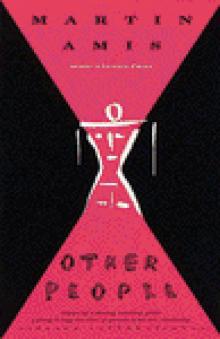 Other People
Other People The Zone of Interest
The Zone of Interest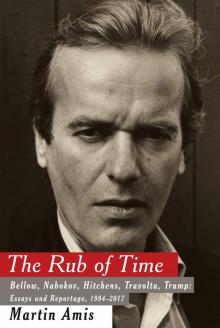 The Rub of Time: Bellow, Nabokov, Hitchens, Travolta, Trump
The Rub of Time: Bellow, Nabokov, Hitchens, Travolta, Trump Koba the Dread
Koba the Dread Success
Success London Fields
London Fields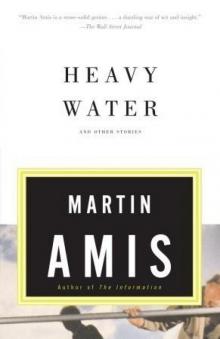 Heavy Water: And Other Stories
Heavy Water: And Other Stories Money
Money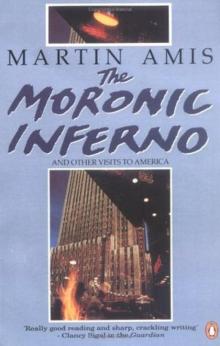 The Moronic Inferno and Other Visits to America
The Moronic Inferno and Other Visits to America Yellow Dog
Yellow Dog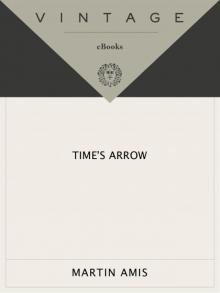 Time's Arrow
Time's Arrow Experience: A Memoir
Experience: A Memoir Einstein's Monsters
Einstein's Monsters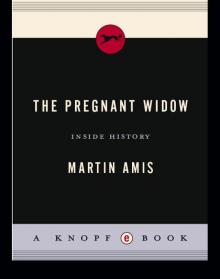 The Pregnant Widow
The Pregnant Widow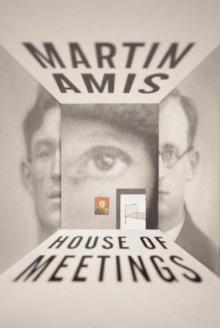 House of Meetings
House of Meetings The Information
The Information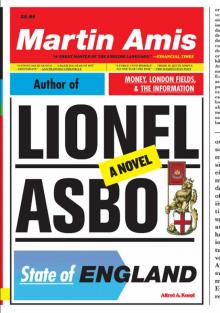 Lionel Asbo: State of England
Lionel Asbo: State of England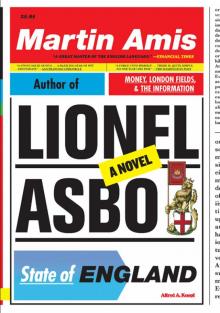 Lionel Asbo
Lionel Asbo Heavy Water and Other Stories
Heavy Water and Other Stories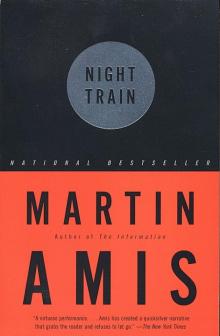 Night Train
Night Train Heavy Water
Heavy Water The War Against Cliche: Essays and Reviews 1971-2000 (Vintage International)
The War Against Cliche: Essays and Reviews 1971-2000 (Vintage International)